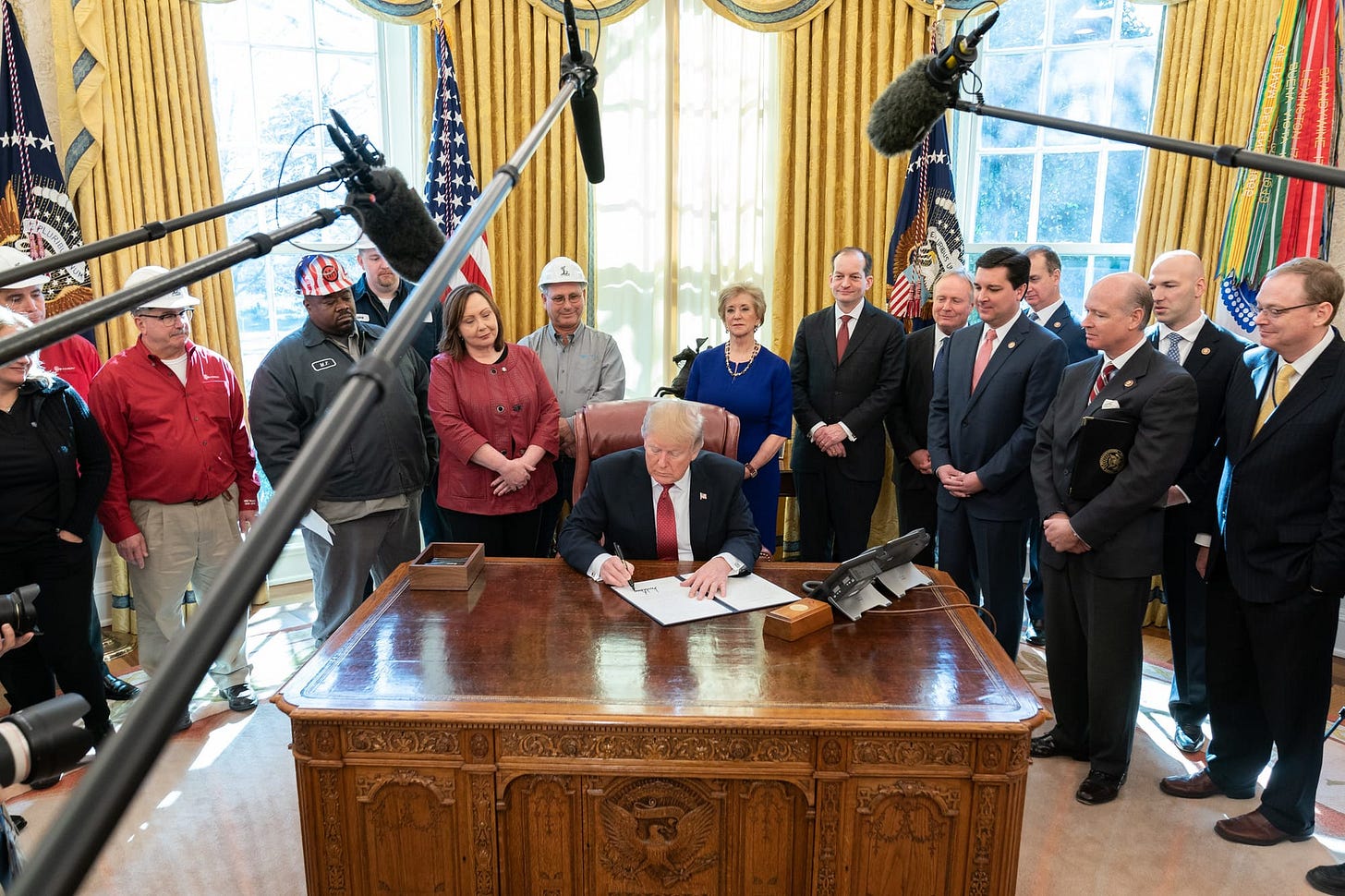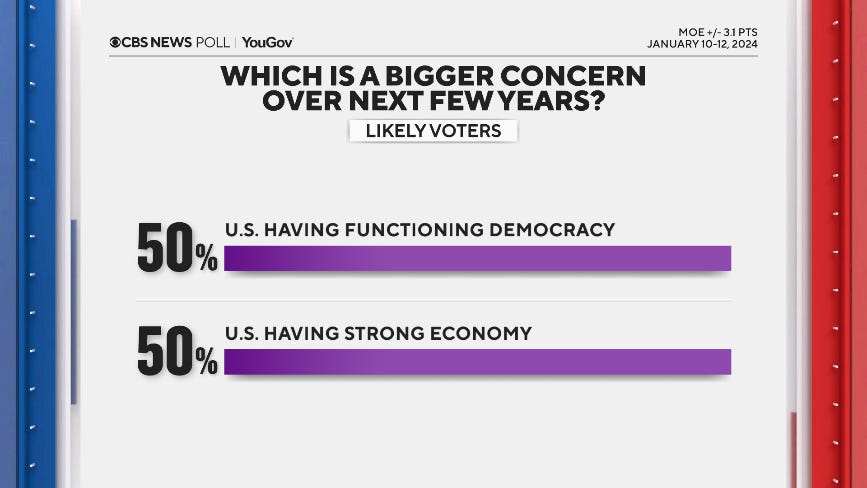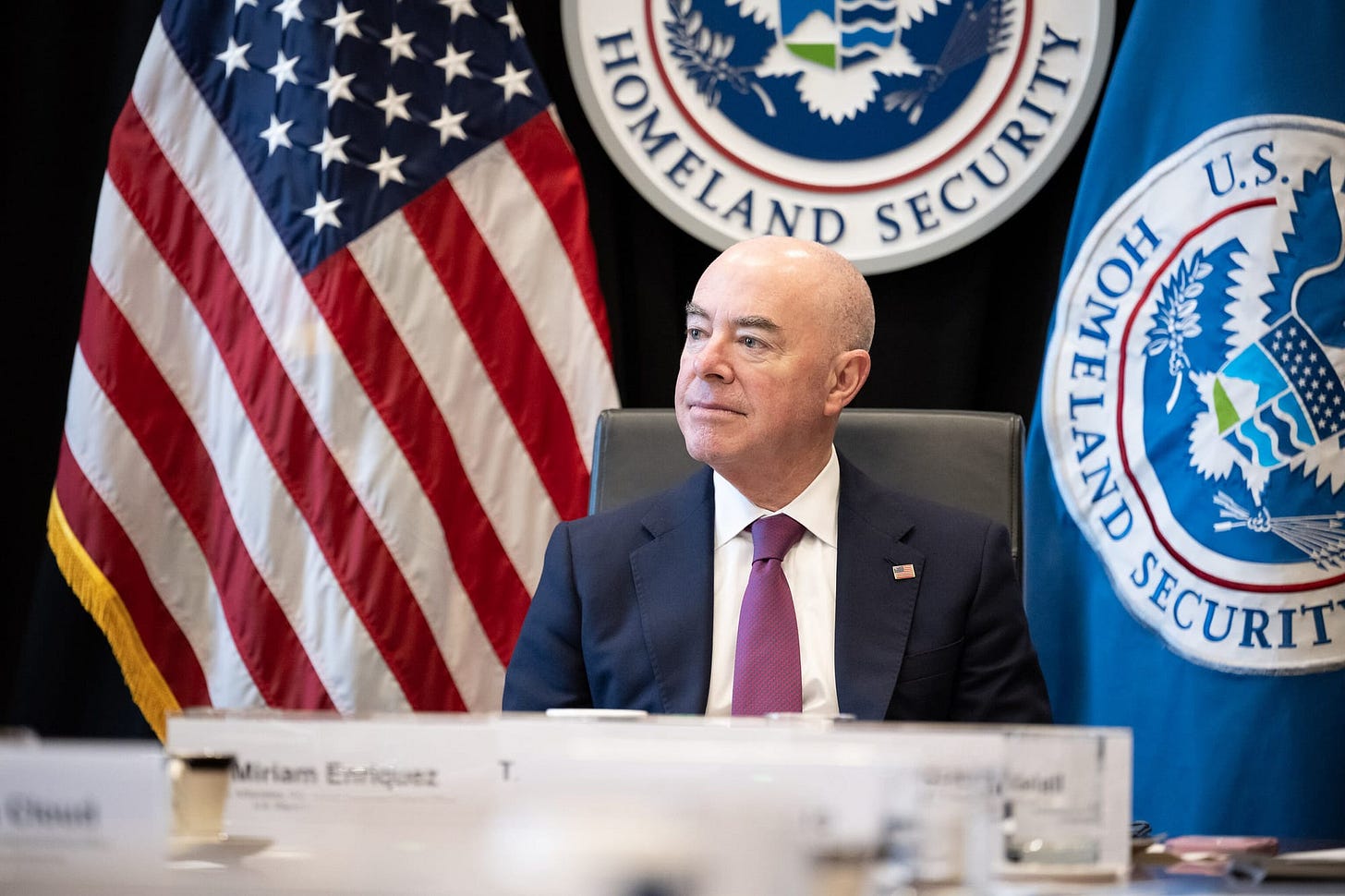Trump’s policy agenda is unpopular. It’s also winning.
And other puzzling contradictions in an age of mismatches.
Good morning! It’s Tuesday, February 6, 2024. Election Day is 273 days away. If this newsletter was forwarded to you, subscribe here. If you want to contribute to support my work, donate here.
Nine-month-early pre-election polls, as I’ve written previously, should not be imbued with a predictive power that the evidence suggests they do not have.
But they should still be taken seriously as respectable gauges of public opinion in the current moment, especially if a series of high-quality polls are all saying the same thing.
And, right now, many high-quality polls are saying the same thing: The race between Donald Trump and Joe Biden is a close one, but Trump appears to hold an ever-so-slight edge.
In the last week, surveys from CNN/SSRS (FiveThirtyEight pollster rating: 2 stars out of 3) and NBC News (2.6/3) have continued this trend, showing Trump with a four-point and five-point advantage among registered voters, respectively.
To be clear, there are polls that show a different read: Quinnipiac’s (2.8/3) latest survey has Biden up six. But the aggregate (which is the best way to consume polls) shows Trump with a slim — not insurmountable, not unchangeable in the next nine months, but nevertheless noticeable — advantage. The RealClearPolitics polling average currently stands at Trump 46.7, Biden 44.6.
That lead is all the more extraordinary because Trump is (a) Trump, with all the attendant baggage that brings; (b) a Republican (as CNN’s Harry Enten notes, “this is the first time that a Republican for president has held a consistent lead in national polling since 2004”); and (c) the face of a policy agenda that is deeply unpopular among American voters. More on (c) in a moment.
It has been sometimes theorized in recent weeks, including by me, that Trump’s slight edge is — for the moment — hard to take seriously, since polling had been showing that so many voters do not believe the 2024 contest will actually be fought between the two unpopular geriatrics who are the likely nominees. Trump’s bombast has melted into the background music of American life, this theory goes, and voters aren’t yet clocking his hard-right platform or the fact that he is poised to become the Republican pick for a third straight cycle. Until they do, it is said, there is no point paying close attention to the polls.
That theory was dealt two setbacks this week — or, at least, two data points emerged that suggest it may already be outdated, no longer holding much explanatory power. First, as I guessed after the Iowa caucuses, Trump’s two consecutive primary blowouts has led to more Americans understanding is the likely GOP nominee.
According to Data for Progress, the share of Americans who believe 2024 will be Trump vs. Biden has zoomed from 51% in December to 67% after New Hampshire. That’s still only two-thirds, of course, but it’s a significant increase; clearly, the percentage of Americans in denial about the coming rematch is declining.
And then the other blow to the Tuned-Out Theory: Americans do understand Trump is running on a more extreme policy platform. They just don’t care.
That much is made clear in the aforementioned CNN poll, which asks a clever set of questions about Trump’s policies — and finds that Americans are fully aware of his extreme platform, do not support it, and are prepared to cast their ballots for him anyways.
According to the poll:
89% of registered voters believe Trump would try to “detain and deport millions of undocumented immigrants” in a second term. 48% support that as a policy, 52% oppose it.
77% believe he would try to “repeal and replace the Affordable Care Act, also known as Obamacare.” 39% support that, 61% oppose it.
74% believe he would “direct the Justice Department to investigate his political rivals.” 31% support that, 69% oppose it.
78% believe he would “fire people in the federal workforce who oppose implementing his policies.” 34% support that, 66% oppose it.
77% believe he would “pardon most people convicted of crimes for their involvement in the Jan. 6 attack on the U.S. Capitol.” 31% support that, 69% oppose it.
And then the kicker: 49% would vote for Trump for president if the election were held today. 45% would vote for Biden.
There is an obvious mismatch here. None of the Trump policies mentioned by CNN receive majority support from voters (most are not even close) and yet — even though they are fully cognizant that he is pushing them — a considerable segment of those voters say they are prepared to vote for him regardless.
How might we make sense of this? One answer could be that there is some set of Trump policies CNN didn’t ask about that voters do support, so much so that it outweighs their opposition of the policies that were asked about.
Another answer is that voters oppose Trump’s policies writ large, but they are frustrated enough by Biden — and, per polling, skeptical of his age and mental capacity — that they are prepared to roll the dice and try again with 45.
My best guess is that the contradiction can be explained with a combination of these two answers. There may not be a set of specific Trump policies, per se, that voters are quietly glomming to — and like so much more than their dislike of, say, pardoning Capitol rioters — but, instead, they are reacting to their memories of the Trump administration, which are more favorable than their perceptions of the Biden administration in a few key areas.
Which areas? NBC’s most recent poll gives us a clue. The survey asked registered voters whether they thought Trump or Biden would be better at handling certain issues. The three with the largest gaps: the border (57% say Trump would be better, 22% say Biden); the economy (55% say Trump, 33% say Biden); and crime (50% say Trump, 29% say Biden).
Recall that another recent poll found Americans split exactly 50-50 on whether they were more concerned about the U.S. having a strong economy or a strong democracy in the next few years. Until Biden can improve the percentage of Americans who trust him to handle the economy (and other issues they feel viscerally, like crime and immigration), he will likely find difficulty persuading them to care about things like January 6th pardons or “deep state” firings — even if those are ideas Americans aren’t thrilled about.
That said, it will be an election of negative partisanship. In the CNN poll, 68% of Biden voters and 40% of Trump voters said their votes would be more about opposing the other candidate than supporting their own. Trump will work to make the things people don’t like about Biden (the economy, border, etc.) most salient, while Biden will do the same with the things people don’t like about Trump (abortion, repealing Obamacare, etc.). May the best negative ads win.
So far, with nine months to go, Trump’s efforts appear to be having more success.
Postscript: An age of mismatches
This is just one of the many contradictions in our politics right now that I find fascinating. Voters disapprove of Biden, but vote for Democrats in 2022. People like their economic position, but dislike the economy. Voters hate Congress, but love their congressperson. As I wrote yesterday, people say they want bipartisanship, but rarely vote like it. And now: They dislike Trump’s policies, but are ready to vote for him.
These mismatches bring to mind two things you should keep in the back of your head when considering public opinion data:
#1: There is a general malaise in America and dislike of, well, everything that could be driving some of these poll answers. Per NBC, 73% (!) of voters think the country is on the wrong track. This bipartisan sense of existential dread — often only on a societal level (on a personal level, many say they’re doing just fine) — could be one explanation for these mismatches. Perhaps that angst is leading voters to seek more constant change, even if it contradicts their other stated preferences, like their opposition to the change candidate’s policies. (Note that control of either the House, Senate, or White House has flipped in each of the last five election cycles.)
#2: In an age of mismatches, parties are king. Polarization can likely explain a lot of this, too. In the same way that a lot of Democrats are unhappy with the economy but plan to vote for Biden due to party loyalty, a lot of Republicans are unhappy with Trump’s extreme proposals but will vote for him because of the (R) next to his name. Indicators like job approval or questions about a candidate’s policies don’t tell us as much in an era where voters are highly polarized and willing to overlook a lot they don’t like about a candidate in order to toe their party line.
Also, one more thing. Yesterday, I wrote that the Senate border deal will be a key test for Congress’ capacity to get things done. In a moment, you will see that they are failing that test — something Americans are noticing. I wonder if the pervasive feeling that Washington is dysfunctional is also influencing voters who oppose a candidate’s policies but are still willing to vote for them.
In an age when many voters think nothing gets done, what’s the risk in backing a candidate whose policies you aren’t thrilled about? It’s not like Trump will actually be able to repeal Obamacare, a voter like this might think. (They’d probably be right.) So, if you’re unhappy with the current administration, this thinking would go, you might as well spring for a shakeup, knowing that most of the more extreme ideas of their opponent are probably headed for the dustbin anyways.
More news to know.
The bipartisan Senate border deal appears to have died an early death. About two-dozen Republicans, plus a trio of Democrats, announced opposition to the agreement on Monday, appearing to doom the bill just hours after it was released. But the real death knell came Monday night, when Senate Minority Leader Mitch McConnell (R-KY) reportedly recommended that his GOP colleagues vote against the package advancing in a vote scheduled for Wednesday.
McConnell has long been the biggest Republican champion of a combined Ukraine/border bill; just hours before his private recommendation, he was on the Senate floor lauding the agreement. With McConnell now following the political winds and coming out against it, the package is expected to be blocked on Wednesday. Even Sen. James Lankford (R-OK), the top Republican negotiator for the deal, would not tell reporters Monday how he planned to vote.
“Just gobsmacked,” Sen. Brian Schatz (D-HI) wrote on X. “I’ve never seen anything like it. They literally demanded specific policy, got it, and then killed it.”
More headlines:
A Major Sign of Trouble in Nancy Mace’s Office: Total Staff Turnover / The Daily Beast
Trump meets with Ronna McDaniel — then says he’ll be recommending RNC changes / Politico
In reversal, Rep. Victoria Spartz to seek re-election for Indiana seat / NBC
Hurricanes are getting so intense, scientists propose a Category 6 / WaPo
The day ahead.
White House: President Biden will receive his daily intelligence briefing this morning and host a Black History Month reception tonight.
Vice President Harris will travel to Savannah, Georgia, where she will deliver a speech as part of her “Fight for Reproductive Freedoms” tour. Later, she will return to Washington to attend the White House reception for Black History Month.
Congress: The Senate will vote on confirmation of Kurt Campbell’s nomination to be Deputy Secretary of State and Amy Baggio’s nomination to be a U.S. District Judge for the District of Oregon.
The House will hold votes on a resolution to impeach Alejandro Mayorkas as Secretary of Homeland Security and a measure to provide $17.6 billion in aid to Israel.
The Mayorkas impeachment vote is expected to divide Republicans, with at least two GOP lawmakers planning to vote “no.” (One more “no” would likely sink the effort.) The Israel vote, meanwhile, will split Democrats: some pro-Israel Democrats are planning to support the bill, while President Biden has threatened to veto it because it does not include aid for Ukraine as well.
Campaign trail: Nevada will hold its Democratic and Republican presidential primaries today — with an asterisk. A 2021 state law required both parties to hold primaries, but the state GOP opted to stick with their traditional caucus, so today’s primary will be a “beauty contest” where no delegates will be awarded.
The state party also blocked candidates from participating in both the primary and the caucuses. Nikki Haley chose the (non-binding) primary, so she’ll be on the ballot today, but win no delegates. Donald Trump, meanwhile, will be the only choice at the caucuses on Thursday, meaning he will sweep the state’s 26 delegates.
On the Democratic side, Rep. Dean Phillips (D-MN) entered the race too late to file for the Nevada primary, so only President Biden and Marianne Williamson will be on the ballot.
Thanks for reading.
I get up each morning to write Wake Up To Politics because I’m committed to offering an independent and reliable news source that helps you navigate our political system and understand what’s going on in government.
The newsletter is completely free and ad-free — but if you appreciate the work that goes into it, here’s how you can help:
Donate to support my work or set up a recurring donation (akin to a regular subscription to another news outlet).
Buy some WUTP merchandise to show off your support (and score a cool mug or hoodie in the process!)
Tell your family, friends, and colleagues to sign up at wakeuptopolitics.com. Every forward helps!
If you have any questions or feedback, feel free to email me: my inbox is always open.
Thanks so much for waking up to politics! Have a great day.
— Gabe






